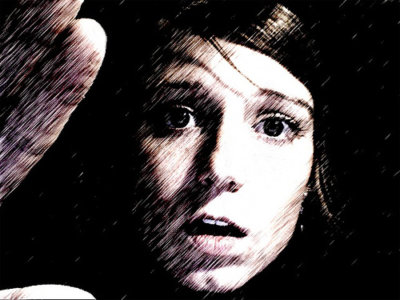Successfully Overcoming Depression: A Case Study

By: Lauren McKinnon
When I look back at how my life used to be, it is almost impossible to believe the transformation.
Overcoming depression has been a long process, but it’s been worth it, because today I live my life as the person I know I as meant to be. It’s a vast difference from the miserable alcoholic that I once was.
How it started
I was born in Balham, London, where my family lived the first few years of my life. I remember being about three and my favourite thing being going to the park with my mother. She’d sit on a bench and I would run to a huge tree that was in the middle of the grass, wave at her, then run back, and she’d give me a big hug. Then I’d do it all over again.
I guess I thought she’d always be there for me to run back to. But that park was actually the very place she abandoned me.
She just left me on a park bench. I’ll never know how long I sat there before a family friend came to collect me. I wasn’t scared at the time, I knew the woman who came and was happy to go with her, and in my innocent child’s mind I had no reason to doubt my Mum. It simply it never occurred to me that she had left me.
I can’t remember when it hit me that she wasn’t coming back. It was a slow realisation because, as odd as it still seems to me now, no one mentioned her. I was returned home to my father and it was as if suddenly my mother didn’t exist. For years, there was just complete silence regarding her disappearance, and if I dared ask the subject was changed. And as my mother was from France, we didn’t really have much contact with her family, and if we did hear from them they, too. pretended she didn’t exist.
Like all children who are victims of an adult decision they are not made part of but suffer from, I blamed myself for what had happened. By the time I went to school I felt certain of two things; my mum had left me because I was bad, and because she didn’t love me. Yet I grew up holding tight to the dream that she would come back and prove me wrong.
But I never saw her again. To this day I have no idea why she left.
Sadly, my mother’s abandonment is only a small part of the story about how I ended up a depressed, anxious adult with no confidence. Because the worst thing about her leaving was that I was left with my father. Although I was given no reasons for my mother’s leaving, my father made good use of my mother’s disappearance as an excuse for anything and everything. I was a very timid and nervous child and whenever teachers would express their concern, my dad would automatically lay the blame on my mother. “She’s like that because her mother left her,” he was fond of saying. And when he was being critical of me it was always, “It’s no wonder your mum left you”. Or, “No one will ever love you – your mother never did”. And then there was, “You’re so like your mother”.
And I wonder why I blamed myself!

By: Lisa Cyr
I didn’t tell anyone about the things he said. He was a very charming man, admired by others for raising his kids alone (not common in the 1970s), so who would have believed me anyway? Who would have known that he was a manipulative man who thrived on demeaning and degrading others?
He had a particular hatred of women. I remember being told off by a primary school teacher because I was trying to find a word in the dictionary, a name that my father called me. I had been looking at words beginning with ‘h’ and asked my teacher how to spell ‘whore’. She thought I was being rude and I didn’t dare tell her the truth.
As I got older, it became my looks my father judged me more and more on. As a teenager he was obsessed with my having a waist that was 22 inches, but mine was only 23 inches, and it wasn’t good enough. As for schoolwork, if I got 98%, he would focus on the 2% that I didn’t get.
Controlling is an understatement. It shocks me now the way my father monitored me, but at the time I didn’t know any different.
Everything was part of a deal. If I wanted to eat a certain food then I had to do something for him. Even when I moved out he would turn up wherever I was living and refuse to leave. Even when I was an he would ring up the manager wherever it was I worked (particularly when I was working as a social worker) and tell them what a dreadful person I was and try to get me sacked. In fact I remember the first job I got after I finished my degree. I was so excited. He asked me how much they would be paying me, and when I told him, he replied, “You’re not worth that”.
As for any attempt I made to find love? My father would try to sabotage any relationship I attempted through intimidation, making the man’s life misery with threats and turning up uninvited to sit outside their house. It sounds like a movie writing it, but it was honestly my life.
In summary, I grew up fearing everything and everybody, believed I was worthless and unlovable. The foundations for a twenty-five year struggle with depression were firmly in place.
Being diagnosed as depressed
 Aged 14, I went on my own to our family GP and told him how miserable I felt. He knew our family circumstances, if not the whole story (I was too scared to tell him). So he treated my symptoms on the basis that I wasn’t coping because I was a teenage girl growing up without a mother. I was given tranquillisers.
Aged 14, I went on my own to our family GP and told him how miserable I felt. He knew our family circumstances, if not the whole story (I was too scared to tell him). So he treated my symptoms on the basis that I wasn’t coping because I was a teenage girl growing up without a mother. I was given tranquillisers.
When I was 18 I went back and told him that I felt like killing myself. He acted immediately and was very supportive, and I was admitted to hospital for a few days and put on anti-depressants. Looking back, and hearing other people’s stories, I do feel I really have been very fortunate to have had sympathetic doctors all of my life.
Like many who suffer depression, mine was an ongoing condition that worsened during stressful or challenging life events. During those episodes I was offered short-term psychotherapy and my medication was increased. This relieved my anxieties and raised my sense of well-being for a while, but the depths of the scars to my emotional self were going to require a much more intensive intervention to come.
The effects of depression on my adult life
As an adult, on the outside I appeared to be functioning as a successful, carefree professional. I was awaeded a BA Honors in Applied Social Science (Psychology and Social Policy) and a CQSW (Certificate in Qualification of Social Work) and worked for 15 years as a children and families social worker in England and Germany. It was like I could easily help others but could not help myself.
Because the reality was that I was really a very unhappy, troubled, isolated woman. Depression for me was like looking out from the inside of a goldfish bowl. I could see and hear everyone, but I couldn’t connect.
The abandonment by my mother combined with the criticism I put up with from my father left me severely under confident, and with a fear of rejection that progressed into a fear of attachment. In other words, I couldn’t do intimacy. I just couldn’t develop relationships on anything more than a superficial level.
Even in friendships I always maintained a distance. At school and college I had a few close friends but I would often take time out to be on my own because I just couldn’t bear to be around people, especially if they seemed happy and were easily getting on with their lives. It just made me so aware that I secretly was neither.
As for intimate relationships, I really struggled. Even when my friends were getting married and settling down, I was still avoiding any commitment at all. To be fair, I was briefly engaged aged 20, but I bailed because even though I loved him I told myself there must be more to life and that the marriage would just fail. That was my pattern; I’d get into a serious relationship, convince myself it would all go wrong, and end it. Then I gave up on even trying to be serious and moved into a pattern of consciously having superficial relationships or dating men who were upfront in not wanting commitment.
Instead of close relationships I turned to alcohol…
Alcoholism and depression

By: jenny downing
My dad once remarked that he would rather I got pregnant than drunk. I was around 14 at the time and looking for any opportunity to go against him, and so when I got the opportunity to try wine at a friends’ house I didn’t need persuading. I loved it from the first sip.
When I was legally old enough to buy drink for myself, my dad knew I was hooked. He hated it. But I was an adult and he could do nothing about it. I loved that it upset him.
Unfortunately, in my attempt to get my own back on him, I ended up abusing drink and becoming dependent. He never knew that I was drinking excessively before he died, but by the time he did die I couldn’t give up even though I wanted to.
I see now that alcohol was my way to numb my emotional pain and feel confident. By the time I was in my twenties I regularly spent whole weekends not talking to anyone, preferring to get drunk, comfort eat and detach from reality. Friends did notice and were not at all surprised when I did eventually have a complete breakdown.
Breakdown
Inevitably the calming, soothing effects of occasional alcohol ceased. Alcohol is of course a depressant, so rather than alleviating my symptoms it began to make them much worse. But it was too late, I couldn’t stop – I had crossed the line into dependency.
Looking back I can see there was really never anything social about my drinking – I always drank to get drunk. I drank regularly for five years in increasing amounts, and eventually I was drinking every day and night, from first thing on waking to the last thing I did before I went to sleep.
Alcohol took me from being depressed to being suicidal. I looked terrible – my eyes were always bloodshot, I reeked of booze, I put on a couple of stone and everything ached. In the last couple of years of my alcoholism I was taking more and more time off work, avoiding friends and generally hiding from the world.
There were two major events that led to my eventual breakdown. First was the decision to search for my mother when I was 22. As agonising as it was, I had prepared myself for the fact that she would have another family, so that I was ready to deal with. I managed to find her next husband. It turned out though she hadn’t had any further kids with him, although he had had a daughter of his own.
But who could have prepared me to find out that my own mother had told everyone that her daughter, aka me, had been killed in a car crash? That she would have tried to erase me from existence?
The crazy thing was that she had abandoned her second family without a trace, too.
I suppose hearing that she had told others I didn’t exist wasn’t enough to stop me, as I did ask Salvation Army for help tracing her (at the time they were the biggest organisation to trace family members). Unfortunately if they trace someone and that person says they don’t want to be contacted by whoever is looking for them, the Salvation Army can’t give away any details. So they weren’t allowed to tell me for definite if they had found her, but I am fairly certain they did and she didn’t want to have contact with me or know about me.
The second event that knocked me down was when my father died unexpectedly when I was 27. I’d always believed that his death would mean instant emotional healing and freedom, but instead I found that my depression intensified to a much deeper and darker level than ever before.
This all led to me eventually being off work for several months, getting into terrible debt, drinking very heavily, and finally getting dumped by the man I was with. And that all led to an alcohol induced-suicide attempt and voluntary admission to a psychiatric ward where I stayed for several weeks, because amongst all that I had lost was my will to live.
Getting my life back
 Maybe some of us have to hit rock bottom before we are ready to get better. It was like I was finally left left with no choice but to surrender to my illnesses or die from them. With the expertise and commitment of medical staff, I was able to admit to my struggles with depression and my alcoholism. The stigmas of those issues were no longer relevant in my battle to survive, so I gave myself permission to hand over everything that was harming me.
Maybe some of us have to hit rock bottom before we are ready to get better. It was like I was finally left left with no choice but to surrender to my illnesses or die from them. With the expertise and commitment of medical staff, I was able to admit to my struggles with depression and my alcoholism. The stigmas of those issues were no longer relevant in my battle to survive, so I gave myself permission to hand over everything that was harming me.
Admittedly, being in the hospital was pretty scary at first. They took me off all medication and what I remember most was crying for hours on end. But the nursing staff was kind, understanding, patient and encouraging. I was surprised at the amount of professionals who were in there with me – a musician, a professor, a midwife. I guess I had my own set of stigmas about depression.
After my hospital stay I was fortunate enough to be offered a six-month spot in residential rehab. Gradually I confronted my past and learnt not only to accept what had happened, but to replace my mistaken perceptions with the truth. A faith-based 12-step programme of all women, it was all group work and very intense and hard. But it was what I needed. Reclaiming my faith also allowed me to come to a place of acceptance and forgiveness.
The upside to depression
Whilst depression had brought me to the point of giving up, it was also the catalyst for my healing. It gave me the opportunity to work through my shame and to grasp the truth that I had the choice within myself to choose my life instead of live as a prisoner of my past. I wasn’t unlovable and inadequate. I was powerful.
Living my life as the person I was meant to be
My recovery has continued for many years since I left hospital and rehab. Sixteen years on, I am still on my journey. Learning how to love myself and then love someone else was a big part of my healing process, as was learning how to forgive.
Today I take care of myself physically and emotionally. I try to eat healthily, exercise regularly and get enough sleep. No matter how busy I am I always find a few minutes of serenity. Sometimes that’s in a prayer, or music, or reading a book. I’m also am mindful of those triggers which may jeopardise my mental health or my sobriety, such as confrontation or fatigue.
I can honestly now say I love myself and my life. It is a life I share with great friends, inspiring colleagues, a wonderful husband (we met six months after I left rehab) as well as two amazing daughters who constantly inspire me to keep well and enjoy myself. It’s good to be me.
Are you depressed? A few words of advice
If you are tired of feeling hopeless and helpless then it’s time to reach out and seek help (you might want to start by reading a comprehensive guide to depression and resources available). Whoever you are and whatever your circumstances, it is possible to overcome those events that underlie your symptoms and make the transition to long-term restoration. With the right support you can learn to overcome your past, embrace who you are today, and think positively about tomorrow. You deserve it.
 Carolyn Hughes writes freelance for a variety of magazines and publications in the UK and the United States. A large proportion of her work specialises in addiction and mental health issues which stems from her personal story of alcoholism and depression. Her popular blog the Hurt Healer reflects her passion to help others make their own successful journey in emotional recovery and to live their life as the person they were meant to be.
Carolyn Hughes writes freelance for a variety of magazines and publications in the UK and the United States. A large proportion of her work specialises in addiction and mental health issues which stems from her personal story of alcoholism and depression. Her popular blog the Hurt Healer reflects her passion to help others make their own successful journey in emotional recovery and to live their life as the person they were meant to be.





Thank you for this article. While reading it, I began to walk through my own life and struggles. Reading this helped me have a framework that I am not alone and I am not helpless. Reflecting on some of the memories that popped up while reading, I was reminded of the numbness and silence and sense of disconnection that I experienced from my childhood into my teenage years and now. This article has been such an encouragement to honor the ways in which I have grown and changed and the ways in which I have learned to seek help and be more self-aware. Most definitely it has helped in understanding that I am not as strange as I once believed because of my past experiences
Hi Kyra, we are so glad that it was helpful. And we assure you are far, far from alone. So many of us have a complicated past and suffer depression, but feel we have to pretend things are fine to those around us. As for helpless, you sound very self aware and reflective, and it’s wonderful you have learned to seek help. We wish you ongoing courage in the journey! Best, HT.
The article is so encouraging.Thank you for sharing.